
Journal of Flood Risk Management
Scope & Guideline
Transforming knowledge into action for flood safety.
Introduction
Aims and Scopes
- Flood Risk Assessment and Management:
The journal emphasizes comprehensive methodologies for assessing flood risks, including quantitative modeling, historical data analysis, and socio-economic impacts. It promotes innovative approaches to manage flood risks through both structural and non-structural measures. - Urban Flooding and Resilience:
A significant focus is placed on urban flooding issues, exploring the complexities of flood dynamics in urban areas and strategies for enhancing urban resilience. This includes studies on land use planning, infrastructure resilience, and community engagement. - Climate Change Impacts on Flooding:
The journal addresses the interplay between climate change and flooding, investigating how changing weather patterns and extreme events influence flood risks. Research includes modeling future flood scenarios and evaluating adaptation strategies. - Nature-Based Solutions and Sustainable Practices:
There is a growing interest in nature-based solutions for flood management, emphasizing sustainable practices that integrate ecological principles into flood risk reduction strategies. - Technological Innovations in Flood Modeling:
The journal encourages the use of advanced technologies such as remote sensing, machine learning, and hydrodynamic modeling to improve flood prediction, monitoring, and management.
Trending and Emerging
- Integrated Flood Risk Management Approaches:
There is a growing trend towards integrated flood risk management frameworks that consider social, economic, and environmental dimensions. This holistic approach reflects the complexity of flood risk and the need for collaborative strategies across various sectors. - Community Engagement and Social Resilience:
Research exploring community participation and social resilience in flood risk management is on the rise. This includes understanding local knowledge, experiences, and the role of communities in adapting to flood risks. - Technological Advances in Flood Prediction:
The use of advanced technologies, including artificial intelligence, machine learning, and remote sensing, is increasingly prominent. These technologies enhance flood prediction capabilities and provide real-time data for more effective management. - Climate Adaptation Strategies:
There is an emerging focus on climate adaptation strategies and their implications for flood risk management. Research is increasingly addressing how communities can adapt to changing flood patterns resulting from climate change. - Nature-Based Solutions and Ecosystem Services:
The incorporation of nature-based solutions, such as floodplain restoration and green infrastructure, is gaining traction as a sustainable approach to flood risk management, reflecting a shift towards leveraging natural systems for enhanced resilience.
Declining or Waning
- Historical Flood Events Analysis:
Although historical analysis remains important, the frequency of papers focusing solely on retrospective studies of past flood events has decreased, indicating a shift towards more forward-looking research that prioritizes predictive modeling and proactive management. - Infrastructure-Centric Solutions:
There appears to be a decline in articles centered around traditional engineering solutions for flood control, such as levee construction and dam engineering. This may reflect a broader trend towards integrating soft engineering and community-based approaches in flood risk management. - Individual Case Studies:
While case studies are valuable, there seems to be a waning emphasis on localized studies without broader applicability, as the journal increasingly favors comparative analyses and transferable methodologies that can be applied across different contexts.
Similar Journals

Journal of Applied Water Engineering and Research
Empowering Policymakers with Applied Water InsightsJournal of Applied Water Engineering and Research is a dynamic platform dedicated to the advancement of knowledge in the field of water science and technology. Published by Taylor & Francis Ltd, this journal aims to bridge the gap between theoretical research and practical applications in water engineering, providing a crucial resource for researchers, practitioners, and policymakers. With an ISSN of 2324-9676 and an impressive ranking in the Q3 category for Water Science and Technology, it occupies a distinctive position within the scholarly community. The journal covers a wide spectrum of topics, including innovative water management strategies, sustainable practices, and the integration of technology in water resource management, thus contributing significantly to the discourse surrounding environmental sustainability. With publication years converging from 2013 to 2024, the Journal of Applied Water Engineering and Research continues to foster impactful research, enhancing our understanding and management of vital water resources.
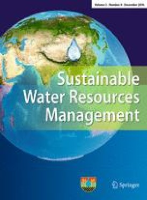
Sustainable Water Resources Management
Fostering innovation in water resource management.Sustainable Water Resources Management is an esteemed journal focusing on the critical field of water resource management in the context of sustainability. Published by Springer International Publishing AG, this journal serves as a vital platform for researchers, policymakers, and practitioners to disseminate cutting-edge research and innovative practices aimed at addressing global water challenges. With an impressive impact factor aligned with its Q2 ranking in Water Science and Technology and Q3 in Renewable Energy, Sustainability, and the Environment, it maintains a robust reputation in its field, evidenced by its Scopus rankings. Covering a diverse range of topics from integrated water resource management to the nexus between water and energy, Sustainable Water Resources Management is committed to fostering knowledge exchange and encouraging interdisciplinary dialogue among its audience. This journal, operating under strict academic rigor, plays an essential role in advancing sustainable practices and is open from 2015 to 2024, making it a relevant resource in today’s rapidly evolving environmental context.

Hydrologie und Wasserbewirtschaftung
Innovating hydrology for a thriving planet.Hydrologie und Wasserbewirtschaftung, published by the BUNDESANSTALT GEWASSERKUNDE-BFG, stands as a vital open access journal in the field of hydrology and water management since its inception in 1999. Based in Germany, this journal aims to disseminate high-quality research related to water resources, environmental sustainability, and innovative management strategies. Though it has a Q4 ranking in Water Science and Technology for 2023, and holds a Scopus rank of 113 out of 225, the journal provides an essential platform for researchers, professionals, and students interested in advancing their understanding of water science. With coverage spanning from 1999 to 2018 and a seamless move to an open access model, Hydrologie und Wasserbewirtschaftung remains committed to contributing to the ongoing dialogue around critical water issues. Researchers looking to publish their findings or stay abreast of developments in water science will find this journal indispensable.

JOURNAL OF HYDROMETEOROLOGY
Unveiling the Dynamics of Weather SystemsJOURNAL OF HYDROMETEOROLOGY, published by the American Meteorological Society, is a leading scholarly journal that serves as a vital resource within the field of atmospheric science. With its ISSN 1525-755X and E-ISSN 1525-7541, this journal provides a platform for the dissemination of high-impact research, currently holding a prestigious Q1 ranking in Atmospheric Science as per the 2023 Category Quartiles. It enjoys an excellent reputation, ranked #30 out of 148 in the Scopus listings, placing it in the top 80th percentile within Earth and Planetary Sciences. Publishing rigorous and innovative studies from 2000 to 2024 and beyond, the journal addresses critical topics including weather forecasting, climate dynamics, and hydrological processes, making it essential reading for researchers, professionals, and students alike. Though not an open-access journal, it continues to enrich the academic community with quality contributions dedicated to advancing our understanding of hydrometeorological phenomena.
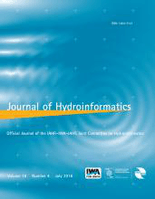
JOURNAL OF HYDROINFORMATICS
Unveiling Insights in Hydroinformatics and Beyond.JOURNAL OF HYDROINFORMATICS, published by IWA PUBLISHING in the United Kingdom, is a leading open access journal in the field of water-related sciences and engineering. Since its inception in 1999, it has evolved to become a pivotal platform for the dissemination of significant research and innovative findings, especially after adopting an open access model in 2021. The journal spans a broad scope, intersecting various disciplines such as atmospheric science, civil and structural engineering, geotechnical engineering, and water science and technology, with its 2023 rankings placing it impressively in the Q2 quartile across several categories. With an impact factor reflective of its esteemed position within the academic community and its reach underscored by its Scopus rankings, the JOURNAL OF HYDROINFORMATICS appeals to a diverse readership including researchers, professionals, and students dedicated to advancing knowledge in hydroinformatics and related fields. Whether you are seeking to publish your cutting-edge research or to stay informed on the latest developments, this journal serves as an indispensable resource.
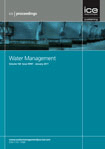
PROCEEDINGS OF THE INSTITUTION OF CIVIL ENGINEERS-WATER MANAGEMENT
Elevating Civil Engineering with Cutting-Edge Water SciencePROCEEDINGS OF THE INSTITUTION OF CIVIL ENGINEERS-WATER MANAGEMENT is a prestigious journal published by Emerald Group Publishing Ltd, dedicated to advancing the field of water management within civil engineering. With an ISSN of 1741-7589 and an E-ISSN of 1751-7729, this journal delivers peer-reviewed research that spans the critical intersections of water science and technology, contributing valuable insights into sustainable water management practices. As evidenced by its ranking in the 2023 Scopus categories, where it holds the Q3 quartile in Water Science and Technology, and a respectable position among its peers, the journal remains a vital resource for researchers, professionals, and students in the field. Though it is not an open-access journal, it offers accessible subscription options that facilitate worldwide dissemination of knowledge, enhancing its role as a fundamental reference point for cutting-edge developments in water management. For those looking to publish or stay updated on the latest research trends, this journal serves as an essential platform for promoting innovation and sustainable practices in civil engineering and water resources management.
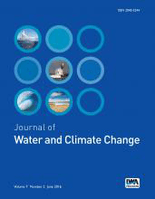
Journal of Water and Climate Change
Transforming Challenges into Opportunities in Water and Climate ScienceJournal of Water and Climate Change is a premier open-access journal published by IWA Publishing, dedicated to advancing the understanding of the interplay between water resources and climate change. With an ISSN of 2040-2244 and an E-ISSN of 2408-9354, this journal has established itself as a crucial platform for interdisciplinary research, publishing high-quality articles that address the challenges posed by climate variability on water systems globally. Since achieving open access status in 2021, the journal has fostered wider dissemination of knowledge among its audience, featuring works that span pivotal topics in Atmospheric Science, Global and Planetary Change, and Water Management. Notably ranked within the top quartiles in several relevant categories as of 2023, it occupies a vital position in the academic community, offering insights that are essential for policymakers, environmental scientists, and researchers striving to create sustainable solutions for water and climate challenges. Its commitment to excellence is reflected in its strong Scopus rankings, standing at the 66th percentile in Water Science and Technology and 65th percentile in Management, Monitoring, Policy, and Law. Located in the United Kingdom, this journal not only serves as a repository of cutting-edge research from 2010 to 2024 but also engages a diverse readership passionate about promoting sustainable water management practices.

LHB-Hydroscience Journal
Unlocking Knowledge for Sustainable Water ManagementLHB-Hydroscience Journal, published by Routledge Journals, Taylor & Francis Ltd in the United Kingdom, stands as a significant platform in the realm of Water Science and Technology. Since its inception in 2021, this open-access journal has been dedicated to disseminating high-quality research that addresses the critical challenges faced in hydroscience, aiming particularly at fostering innovative solutions for sustainable water management. With an impressive E-ISSN of 2767-8490, it offers researchers, professionals, and students the opportunity to access cutting-edge findings without any paywall, thereby promoting wider dissemination and engagement within the academic community. Although it currently holds a Q4 quartile ranking and ranks #208 out of 261 in the Environmental Science category, the journal aspires to elevate its scholarly impact through rigorous peer-reviewed articles that contribute to the field from 2021 to 2024. As recognition of its growing significance, LHB-Hydroscience Journal invites contributions that explore the multidimensional aspects of water science—from interdisciplinary methodologies to real-world applications—catering to an audience eager to push the boundaries of current knowledge.
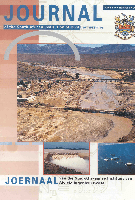
Journal of the South African Institution of Civil Engineering
Elevating standards in civil engineering practices.Journal of the South African Institution of Civil Engineering (ISSN: 1021-2019) is a distinguished open-access publication dedicated to advancing the field of civil engineering in South Africa and beyond. Established by the South African Institution of Civil Engineering (SAICE) and South African Institute of Steel Construction (SAISI), it serves as a critical platform for sharing research, case studies, and industry developments. The journal has been openly accessible since 2015, ensuring broader dissemination of knowledge among researchers, professionals, and students alike. Although it currently holds a Q4 ranking in Civil and Structural Engineering and is positioned within the lower percentiles in Scopus rankings, its commitment to fostering growth in the engineering sector remains strong. Covering various topics from structural design to innovative construction methodologies, the journal invites contributions that push the boundaries of current practices and methodologies. This publication is essential for those invested in sustainable engineering solutions, aiming to collaborate and contribute towards the evolution of civil engineering standards in South Africa.

Tecnologia y Ciencias del Agua
Elevating the discourse on water science and technology.Tecnologia y Ciencias del Agua is a dynamic and innovative open access journal published by the Instituto Mexicano de Tecnología del Agua, dedicated to advancing knowledge in the fields of civil and structural engineering as well as water science and technology. Since its inception in 1930, the journal has provided a platform for interdisciplinary research and discussion, catering to an audience of researchers, professionals, and students interested in the management of water resources and sustainable engineering practices. With an ISSN of 0187-8336, and an E-ISSN of 2007-2422, this journal has converged its focus from 2010 through 2024, although it currently holds Q4 quartiles in its category as per the 2023 rankings, indicating its evolving role within the global landscape of academic publishing. Despite its emerging status, the journal's commitment to disseminating high-quality, peer-reviewed research on critical topics related to water management and engineering continues to enhance its relevance and appeal. The journal is based in Morelos, Mexico, contributing to the region's rich academic tradition while also engaging with a broader international audience through its extensive open access policy.